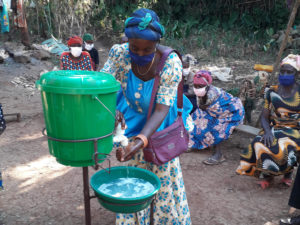Women peacebuilders key to just recovery towards a post-pandemic world

These days in Canada we often hear the phrase “We’re stronger together.” But stronger how? And who, precisely, are “we?”
COVID-19 has exposed the vulnerability of certain communities and, in my work in Canada and globally with Indigenous peoples, migrant workers and women peacebuilders, I have learned that we are only as strong as the most vulnerable among us, and that our collective strength depends on how their needs are addressed.
Indeed, this is echoed in the Just Recovery Principles recently launched by more than 150 civil society groups, which state: “in a globalized world, what happens to one of us matters to all of us.”
While Canada’s financial assistance is understandably focused on national recovery, there is also a need to increase global assistance, especially to human rights defenders and women peacebuilders, if we want to emerge from this pandemic as a more just, peaceful and sustainable world.
In Canada, COVID-19 has helped us understand who the essential workers are, but we must also recognize those unsung heroes around the world who are also continuing to support marginalized communities despite considerable odds.
For example, KAIROS’ women, peace and security partners in Colombia, the Philippines, West Bank, South Sudan and Democratic Republic of Congo have been laying the groundwork for just and sustainable peace for years, sometimes decades. They work with some of the world’s most vulnerable communities at this time when these vulnerabilities have increased, especially for women. All our partners report an increase in gender-based violence, including military repression and human rights violations targeted at women who are traditional community leaders.
In response to the ever-changing context that is COVID-19, these women peacebuilders are creatively adapting their programs to reach marginalized women and ensure their voices are heard, including by migrating some workshops and critically needed training online.
Our partners are using the internet to reach as many communities as possible and train women community leaders, even in remote areas. They are educating communities about the virus and how to stop its spread and delivering food and other critical supplies.
And, significantly, they have not stopped advocating for peace. For example, our partner in Colombia meets online with other civil society organizations and networks to advance the implementation of the Colombian peace agreement.
Our partners teach us that when women victims of violence are provided with the services and care needed to heal, restore dignity and claim their rights, including psychosocial and legal support and human rights training, they become active peacebuilders and human rights defenders themselves.
Their voices are essential to building sustainable peace. According to research by Inclusive Security, peace agreements have a 35 percent greater chance of being more effective and durable when women help draft them.
Canada recognizes the importance of these grassroots women peacebuilders. Its Feminist International Assistance Policy (FIAP) identifies gender equality and the empowerment of women and girls as the best way to eradicate poverty and build a more peaceful, inclusive and equitable world.
And yet, FIAP has been underfunded since its inception, in part because Canada’s official development assistance (ODA) funding has been well below the international standard of 0.7 percent Gross National Income (GNI), much lower than countries such as Norway, which invests 0.94 percent of GNI.
Some may argue that Canada cannot afford to increase its ODA. But if we really believe that we are “in this together” and “stronger together,” if we are listening to vulnerable communities in Canada and around the world, Canada cannot afford not to. If Canada wants to remain a credible advocate and key player in global multilateralism, and a contender for leadership at the United Nations, we must back up our words with financial commitments as other progressive nations have done.
Women peacebuilders and other essential workers provide us with a glimmer of hope, a way forward based on the wellbeing, health, safely and peace for all.
Right now, they need Canada’s financial and political support. And we need their strength to heal from this pandemic – together.
Originally published in the Hill Times on June 8, 2020
